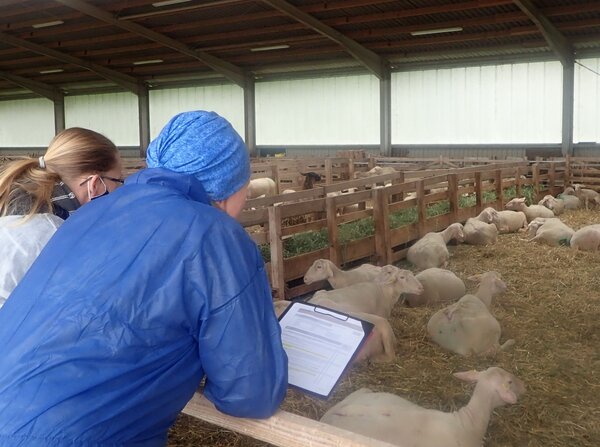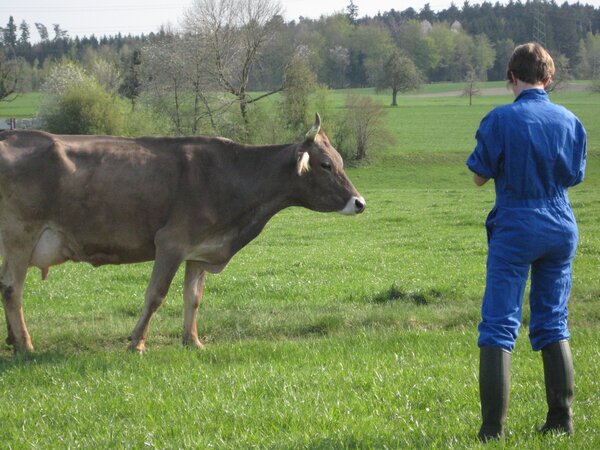Project
Animal welfare monitoring in organic agriculture – improving animal welfare and making it transparent
![[Translate to English:]](/media/_processed_/1/5/csm_OeKoTier_Logo_farbig_cb75a4efab.png)
Development of a reliable, transparent and feasible concept for animal welfare audits of organic farms based on valid and mainly animal-based indicators.
Within the framework of organic inspections, various audit systems of the inspection bodies and the organic farming associations are currently applied to monitor animal welfare on farms. These concepts will be reviewed, further developed and standardized with regard to the criteria of validity, reliability and practicability, considering already existing indicator and assessment systems.
Background and Objective
The objectives of the EU Organic Regulation with regard to animal welfare and animal-friendly husbandry systems are currently monitored primarily via resources, housing- and management-related criteria, e.g. space availability, access to pasture and bedding quality. Animal-related indicators are hardly used. As a result, deficits in animal welfare cannot always be adequately identified and solved on the farms. Although the requirements for husbandry and management offer good preconditions, they do not necessarily lead to a high animal welfare level. Therefore, it is important to include animal-related indicators to the audit concept by taking into account the organic regulation. Due to these reasons the collaborative project "Animal Welfare in organic agriculture – Improving animal welfare and making it transparent (BioTiGer)" was initiated.
The aim of the project, which started on July 1, 2023, is to develop a transparent and practicable audit concept for animal welfare inspections in organic agriculture, which is based on primarily animal-related indicators and have been tested under on-farm conditions. The starting point are the existing animal welfare audit concepts, which are currently used by organic inspection bodies and organic associations. Major challenges are the great diversity of farms due to regional and structural differences, as well as the time and costs required for training auditors and implementing the animal welfare audits on farms. Farm visits are necessary to assess animal-related indicators. In coordination with the German organic sector, the methodology for risk-oriented audits will be developed in a participatory approach, which incorporates existing farm data as well as animal-based data collected by the farmers themselves. The latter can additionally be used by the farms for the animal welfare self-assessment required by the German Animal Welfare Act. This can limit the time required for the external audits. The aim of the animal welfare audit within organic audits is to identify farms with animal welfare problems, in order to subsequently initiate an improvement of animal welfare on these farms and, if necessary – in case of failure to improve a deficient initial situation – to derive measures and sanctions. In this way, consumers' expectations of a high standard of animal welfare on organic farms are taken into account.
Approach
1. Agreement of a set of indicators for animal welfare audits in the context of organic audits for cattle, pigs, laying hens, fattening poultry and small ruminants Development of a risk-oriented, stepwise audit concept.
2. Development of an evaluation concept for animal welfare audits, including thresholds and catalogues of consequential measures.
3. Further development of training and qualification concepts for auditors: training materials for online- and on-farm training as well as online inter-observer reliability testing for animal-based audit indicators. The animal-based indicators training can also be used by the farmers to train for self-assessment.
4. Verification of the feasibility of the animal welfare audit concept developed under (1) - (3), in particular how reliably the different audits steps lead to similar result.
5. Dissemination and coordination: intensive cooperation within the project consortium will ensure that the auditing concept is supported by organic associations, organic auditing bodies and scientific institutions. Furthermore, other external experts (farmers with experience of previous animal welfare inspection schemes, other organic associations and inspection bodies as well as representatives of state authorities and state ministries) will be involved in the project through technical discussions, advisory board meetings and information events, aiming at a sustained use of the auditing concept beyond the project period. The Thünen Institute of Organic Farming coordinates the project and works on the animal species cattle, sheep and goats.
Preliminary Results
The project started on July 2023, so no results are available, yet.
Thünen-Institut für Ökologischen Landbau (Koordination): Dr. Jan Brinkmann, Dr. Silvia Ivemeyer, Dr. Solveig March, Viola Magierski, Merlin Grosse, Johanna Ostermair
Friedrich-Loeffler-Institut – Institut für Tierschutz u. Tierhaltung: Dr. Sally Lühken, Cindy Nyanzi, Dr. Antje Schubbert, Dr. Sabine Dippel, Dr. Annika Hinze
Universität Kassel – Fachgebiet Nutztierethologie und Tierhaltung: Prof. Dr. Ute Knierim, Dr. Julia Johns, Frauke Umbach
Gesellschaft für Ressourcenschutz mbH (GfRS): Dr. Christiane Keppler, Dr. Jochen Neuendorff
ABCERT AG: Dr. Georg Eckert
Kontrollgesellschaft Ökologischer Landbau mbH: Jan Löning
Bioland Beratung GmbH: Dr. Ulrich Schumacher
Naturland – Verband für ökologischen Landbau e.V.: Lukas Vogt, Elisabeth Hofinger
Biokreis e.V.: Julia Krauß
Gäa e.V.: Ute Baumbach, Cindy Pein
Thünen-Contact

Involved Thünen-Partners
Involved external Thünen-Partners
- Friedrich-Loeffler-Institut, Bundesforschungsinstitut für Tiergesundheit (FLI)
(Greifswald-Insel Riems, Braunschweig, Celle, Deutschland) - Universität Kassel
(Kassel, Witzenhausen, Deutschland) -
Bioland Beratung GmbH
(Mainz, Deutschland) - Naturland - Verband für ökologischen Landbau e.V.
(Gräfelfing, Deutschland) - Gesellschaft für Ressourcenschutz mbH (GfRS)
(Göttingen, Deutschland) - ABCERT AG
(Esslingen, Deutschland) - Biokreis e.V.
(Passau, Deutschland) - Gäa e.V.
(Dresden, Deutschland) - Kontrollgesellschaft Ökologischer Landbau mbH
(Karlsruhe, Deutschland)
Publications
- 0
Brinkmann J, Frieten D, Magierski V, Ivemeyer S, March S (2024) Das Tierwohl im Blick [online]. Ökologie & Landbau 52(209=1/2024):28-29, zu finden in <http://www.oekologie-landbau.de> [zitiert am 08.01.2024]
- 1
Magierski V, Ostermair J, Grosse M, Brinkmann J, March S, Ivemeyer S (2024) Tierwohl in der ökologischen Landwirtschaft - Tiergerechtheit weiterentwickeln und transparent machen, Teilprojekt Schaf/Ziege. In: 16. Bioland Schaf- und Ziegentagung 2024, 13. bis 15. Oktober 2024 in Bielefeld mit Online-Übertragung : Tagungsreader. Mainz: Bioland eV, p 16

![[Translate to English:] [Translate to English:]](/media/_processed_/8/e/csm_Bildschirmfoto_2021-03-03_bearb_fc48ac88bf.jpeg)
![[Translate to English:] [Translate to English:]](/media/_processed_/8/e/csm_Bildschirmfoto_2021-03-03_bearb_ba3ec0e9d7.jpeg)


![[Translate to English:] Das Projektkonsortium](/media/_processed_/a/b/csm_3.OEKoTier-Konsortiumstreffen_240826__2__61f1d47c75.jpg)






